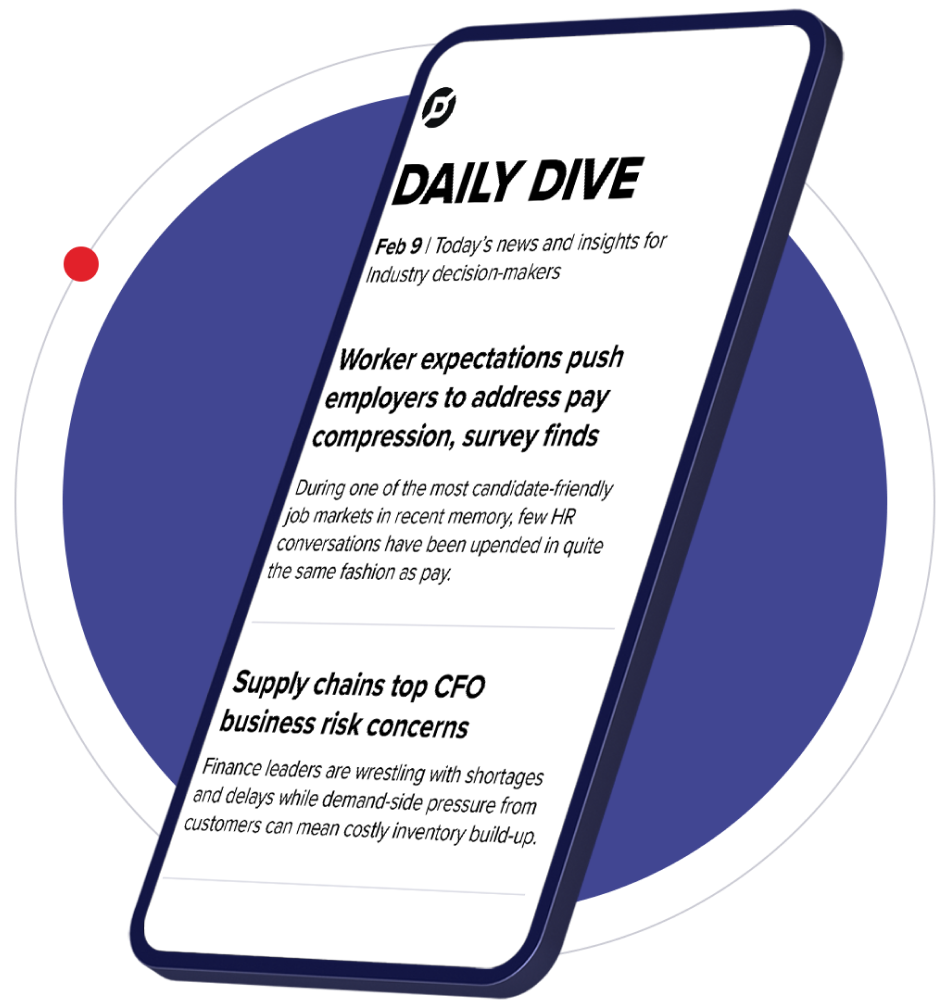Risk and Resilience: Page 93
-
Opinion
Back to the future: The future of American manufacturing is now
America's manufacturing demise has been greatly exaggerated, writes QAD Founder Pam Lopker. In fact, it’s enjoying a resurgence.
By Pam Lopker • Nov. 22, 2017 -
Amazon touts success of recyclable packaging, some customers not convinced
The company is celebrating 10 years of its "frustration-free" and "100% recyclable" shipping, but plenty of excess material is still being used.
By Cole Rosengren • Nov. 21, 2017 -
Late supplier payments lead to low performance, higher costs
Delayed payments yield poor supplier performance, damage relationships and cause more disruptions than any other identified risk.
By Rich Weissman • Nov. 17, 2017 -
'Singles' Day' shopping sprees create more than 160K metric tons of packaging waste
China's annual online shopping "holiday" is a boon for online retailers, but a nightmare for environmentalists.
By Cody Boteler • Nov. 17, 2017 -
Foxconn profits take a hit from iPhone X delays
Delayed components forced Apple's assembly partner to face a 16% rise in operating costs.
By Edwin Lopez , Jennifer McKevitt • Nov. 16, 2017 -
Deep Dive
How do you create 5M apprenticeships? 3 practical considerations
While most employers may now be aware of apprenticeships, many still have questions about how to implement them and what they should look like.
By Kathryn Moody • Nov. 15, 2017 -
Packaging company sues producers over use of product to extend produce shelf life
B&G and Alpine Fresh are among food companies named in Windham Packaging's litigation, which claims its competitors are using its breathable solution without paying for it.
By Sandy Skrovan • Nov. 15, 2017 -
Deep Dive
How data can help build a sustainable supply chain
Specialized apps and software are just a few tools procurement professionals can use to develop more sustainable supply chains.
By Deborah Abrams Kaplan • Nov. 15, 2017 -
ScanTrust receives funding to add QR codes to supply chains
The tech startup just nabbed $4.2 million in funding from Credit Suisse to implement supply chain QR codes and crack down on counterfeit goods and parts.
By Kate Patrick Macri • Nov. 15, 2017 -
Home Depot buoyed by hurricane forces
But the home improvement chain isn't just sitting there reaping benefits of outside forces — it's building a business that maintains a firewall against Amazon, analysts say.
By Daphne Howland • Nov. 14, 2017 -
Talent shortage is reducing contractor availability
ISN surveyed 204 decision makers at 161 companies to evaluate how an industry-wide talent shortage is affecting outsourcing decisions.
By Kate Patrick Macri • Nov. 14, 2017 -
Ford pilots an exoskeleton to reduce worker injuries
New technologies focused on worker safety can help improve productivity and reduce labor risk in the supply chain.
By Edwin Lopez , Jennifer McKevitt • Nov. 14, 2017 -
Deep Dive
What is the future of sustainability in the supply chain?
When will supply chains reach the tipping point that will make the term a key value rather than a goal?
By Edwin Lopez • Nov. 13, 2017 -
'Hard' Brexit risks disrupting supply of thousands of drugs
A departure by the U.K. from the EU without a trade deal could imperil drug supply chains, a trade group of European drugmakers warned.
By Ned Pagliarulo • Nov. 10, 2017 -
Outages, cyberattacks are top supply chain disruptions
The latest BCI Supply Chain Resiliency report lists telecommunication outages but also data breach and loss of talent as some of the biggest supply chain disruptors.
By Kate Patrick Macri • Nov. 10, 2017 -
Ports to spend more on cybersecurity as digital investments rise
Automated ports are the future of the freight industry, but recent events show greater efficiency requires better cybersecurity spend.
By Edwin Lopez • Nov. 9, 2017 -
Deep Dive
5 issues to follow, 1 year after Trump's election
Supply chain risk is at red flag levels due to business uncertainty … driven by politics.
By Rich Weissman • Nov. 9, 2017 -
Cyberattack cost Maersk up to $300M
The Nyetya attack severely impacted Maersk Line and Damco, the group's freight forwarding unit, due to volume and revenue loss.
By Edwin Lopez • Nov. 8, 2017 -
Deep Dive
Have supply chains changed under Trump?
Last year, 48% of our readers said they were optimistic about the state of the supply chain under the new administration. Now, we asked five experts how they feel about it one year into Trump's term.
By Edwin Lopez • Nov. 7, 2017 -
Under Armour faces losses after ERP update
Despite disappointing Q3 data, the company expects to regain lost ground after adjusting to the new system.
By Jennifer McKevitt , Kate Patrick Macri • Nov. 6, 2017 -
OOCL, Evergreen top SeaIntel's ocean carrier reliability ranking
As shippers clamor for visibility, shipping lines with large investments in data and automation rank highest in on-time performance.
By Jennifer McKevitt • Nov. 3, 2017 -
Tesla workers struggle to unionize amid continued production delays
The company will not meet Model 3 production goals and now has an employee satisfaction problem.
By Jennifer McKevitt , Kate Patrick Macri • Nov. 2, 2017 -
Revenue disruption looms for slow-to-digitize industries
Companies with only average or bottom-performing digital upgrades are expected to see at least a 6% decrease in revenue annually.
By Naomi Eide • Nov. 1, 2017 -
Best Buy to offer free holiday shipping
Recognizing that fast and free shipping is less of an option as retailers compete with Amazon, Best Buy has decided to go one step further.
By Daphne Howland • Nov. 1, 2017 -
Atlas Air takes pilots to court
After a lieu of disputes, the airline is accusing disgruntled pilots of deliberately hampering operations.
By Jennifer McKevitt • Nov. 1, 2017




